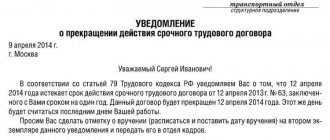What legal norms govern
A fixed-term employment contract is one that is concluded for a period of 5 years. In particular, the signing of such agreements is practiced:
- with persons holding elected positions;
- when temporarily replacing a non-working employee (when the latter retains his job, for example, for women on maternity leave);
- when an employee is sent outside the Russian Federation to perform his work functions;
- if the employing organization was created for a time;
- if necessary, employ persons for several months or weeks (for seasonal or commissioning work), etc.
Before proceeding with the termination of a fixed-term employment contract, you must first check the legality of its conclusion. After all, by default it is necessary to conclude an open-ended contract with an employee, and a fixed-term contract is signed in exceptional circumstances.
The contract must necessarily indicate the duration of its validity , otherwise it is equated to an unlimited term (according to Part 3 of Article 58 of the Labor Code) and then it can be terminated on general grounds (Chapter 13 of the Labor Code).
In addition to the obligation to indicate the term, a fixed-term employment contract must specify the grounds for its conclusion . They must comply with the list under Art. 59 of the Labor Code, otherwise it is also recognized as indefinite according to Part 5 of Art. 58 TK.
A fixed-term employment contract can be terminated on a special basis, which is stated in clause 2, part 1, art. 77 of the Labor Code and Art. 79 of the Labor Code during the simplified procedure for terminating a contract upon expiration.
But it is also possible to dismiss an employee employed under an employment contract for other reasons.
Termination of a fixed-term employment contract at the initiative of the employee
Termination of the contract at the initiative of the employee is permitted if he expresses his desire in writing and submits it to the manager. Dismissal in this case will be subject to the general rules that are prescribed in Art. 80 of the Labor Code.
Dismissal is allowed both after two weeks of service established in the Labor Code, and on any other day by agreement of the parties. If an employee refuses to be fired and withdraws his application, then the employer does not have the right to dismiss him at his own request. The exception is cases when another employee has already been invited to take his place (in accordance with Part 4 of Article 80 and Part 4 of Article 64 of the Labor Code).
As a general rule, an employee is required to notify the employer 2 weeks before dismissal. But if a fixed-term employment contract is concluded for a period of up to 2 months, then the specified period is reduced to 3 days.
Reasons for termination
The conditions for terminating a temporary employment contract depend mainly on the grounds provided for when concluding the contract.
For example, if the basis was to hire an employee to perform seasonal work, then the contract ends when they are completed.
If a permanent employee is replaced, upon his return to work, the employment contract with the employee replacing him is terminated.
The main reason for termination of the STD is upon expiration of the period specified in the contract.
In addition to these grounds, other factors may serve as the reason for the dismissal of an employee:
1. By agreement of the parties. In this situation, the employment contract is terminated according to a mutual decision (employer and employee), although the period specified when concluding the temporary contract has not yet expired. There may be quite a lot of time left before it ends.
2.At the initiative of the employer. The reasons for such termination are reflected in Art. 81 TK. Among them are the employee’s dishonest attitude towards the performance of official duties or frequent cases of violation of labor discipline.
The reason may be an identified violation of the law committed during employment.
An example of this is false documentation submitted by the applicant. If an employee causes material damage to the company, the contract may also be terminated.
Another reason for terminating a contract is the termination of the activities of an enterprise or organization. This method of terminating a STD is often challenged in court.
3.At the initiative of the employee. To terminate an employment relationship at his own request, a citizen writes a statement addressed to the employer indicating the reason for dismissal (family circumstances, illness of relatives, relocation, etc.).
The basis for filing such an application is also a transfer to another job. The application is submitted 14 days before the desired date of dismissal.
During this time, the employee may change his mind, which gives him the right to revoke the document and continue working until the expiration of the previously issued STD.
When terminating a temporary contract, management must correctly draw up all documents justifying the legality of the actions taken. This will avoid lawsuits in the event of a conflict situation.
Other circumstances. It is also possible to terminate the employment relationship under the STD for other reasons caused by unforeseen circumstances.
Among them:
- a court decision on criminal punishment of an employee that is incompatible with the continuation of work;
- loss of qualifications or the right to work in a certain status;
- the occurrence of mental or physical abnormalities that prevent the performance of a certain type of activity;
- an emergency, accident or disaster at work, as a result of which it becomes impossible to perform work duties.
Any of the above circumstances requires documentary evidence. For this purpose, an order is issued justifying the reasons for the early termination of the STD.
Termination of a fixed-term employment contract at the initiative of the employer
The dismissal of an employee employed under a fixed-term contract at the initiative of the employer is carried out under Art. 81 of the Labor Code.
In particular, the employer can initiate the dismissal procedure if the employee grossly violated his work duties, skipped work, committed theft, a staff reduction procedure was initiated, the owner of the company changed, the person responsible for material assets lost the trust of the employer, etc.
In order for the dismissal not to be considered illegal, the employer must strictly comply with the deadlines for warning employees about dismissal. For short-term contracts for a period of up to 2 months, the notice period is 3 days, for seasonal contracts - 7 days.
Such a variation as the employer’s initiative to dismiss is often challenged in court, as well as through appealing the company’s actions to the labor inspectorate or the prosecutor’s office. Therefore, the employer should approach the procedure for terminating a fixed-term employment contract with extreme care. In particular, record the facts of violations committed by the employee: being late, showing up at work drunk, etc.
Also, the parties to a fixed-term employment contract can terminate it by agreement at any time.
Article 77. General grounds for termination of an employment contract
The grounds for termination of an employment contract are:
1) agreement of the parties (Article 78 of this Code);
2) expiration of the employment contract (Article 79 of this Code), except for cases where the employment relationship actually continues and neither party has demanded its termination;
3) termination of an employment contract at the initiative of the employee (Article 80 of this Code);
4) termination of an employment contract at the initiative of the employer (Articles 71 and 81 of this Code);
5) transfer of an employee, at his request or with his consent, to work for another employer or transfer to an elective job (position);
6) the employee’s refusal to continue working in connection with a change in the owner of the organization’s property, a change in the jurisdiction (subordination) of the organization or its reorganization (Article 75 of this Code);
7) the employee’s refusal to continue working due to a change in the terms of the employment contract determined by the parties (part four of Article 74 of this Code);
 the employee’s refusal to transfer to another job, required for him in accordance with a medical report issued in the manner established by federal laws and other regulatory legal acts of the Russian Federation, or the employer’s lack of relevant work (parts three and four of Article 73 of this Code);
the employee’s refusal to transfer to another job, required for him in accordance with a medical report issued in the manner established by federal laws and other regulatory legal acts of the Russian Federation, or the employer’s lack of relevant work (parts three and four of Article 73 of this Code);
9) the employee’s refusal to be transferred to work in another location together with the employer (part one of Article 72.1 of this Code);
10) circumstances beyond the control of the parties (Article 83 of this Code);
11) violation of the rules for concluding an employment contract established by this Code or other federal law, if this violation excludes the possibility of continuing work (Article 84 of this Code).
(Part one as amended by Federal Law No. 90-FZ dated June 30, 2006)
An employment contract may be terminated on other grounds provided for by this Code and other federal laws.
Part three is no longer valid. — Federal Law of June 30, 2006 N 90-FZ.
Termination procedure
In order to terminate a fixed-term employment contract at the end of its validity period, the employee should prepare a notice of termination of this document. If this is not done, then the employer faces the risk of recognizing the contract as indefinite.
According to Part 4 of Art. 58 of the Labor Code, if none of the parties to a fixed-term employment contract demands termination of its validity, then the contract will automatically become permanent. The exception is cases where a temporary employee was hired to replace the functions of another absent employee (under Part 1 of Article 79 of the Labor Code). Such an agreement is terminated when the permanent employee returns to work (Part 3 of Article 79 of the Labor Code).
An agreement that was signed to perform previously fixed work is terminated upon its completion (under Part 2 of Article 79 of the Labor Code) or upon completion of seasonal work (under Part 4 of Article 79 of the Labor Code).
In order to warn an employee about the upcoming termination of an employment contract, it is necessary to send him at least three days notice . The notification is sent in writing signed by the second employee.
The notification is signed by the head of the organization or an authorized employee (usually a human resources specialist). If the signatory was not given the appropriate authority, then the dismissal may be considered illegal.
The notice is drawn up and signed in two copies: one for the employer, the second for the employee. In order to minimize risks in the event of further disputes, the employer should keep one copy of the notice signed by the employee.
The fact of termination of a fixed-term employment contract is confirmed by an order, which the employee is also familiarized with by signature.
A note on the termination of a fixed-term employment contract is entered in the work book.
Article 83. Termination of an employment contract due to circumstances beyond the control of the parties
The employment contract is subject to termination due to the following circumstances beyond the control of the parties:
1) conscription of an employee for military service or sending him to an alternative civilian service that replaces it;
2) reinstatement of an employee who previously performed this work, by decision of the state labor inspectorate or court;
3) failure to be elected to office;
4) sentencing of an employee to a punishment that precludes the continuation of previous work, in accordance with a court verdict that has entered into legal force;
5) recognition of the employee as completely incapable of working in accordance with a medical certificate issued in the manner established by federal laws and other regulatory legal acts of the Russian Federation;
(as amended by Federal Law No. 90-FZ of June 30, 2006)
6) death of an employee or employer - an individual, as well as recognition by a court of an employee or employer - an individual as deceased or missing;
7) the occurrence of emergency circumstances that impede the continuation of labor relations (military action, catastrophe, natural disaster, major accident, epidemic and other emergency circumstances), if this circumstance is recognized by a decision of the Government of the Russian Federation or a government body of the relevant subject of the Russian Federation;
 disqualification or other administrative punishment that precludes the employee from fulfilling his duties under the employment contract;
disqualification or other administrative punishment that precludes the employee from fulfilling his duties under the employment contract;
(Clause 8 introduced by Federal Law No. 90-FZ of June 30, 2006)
9) expiration, suspension of validity for a period of more than two months or deprivation of an employee of a special right (license, right to drive a vehicle, right to carry a weapon, other special right) in accordance with federal laws and other regulatory legal acts of the Russian Federation, if this entails the impossibility of the employee fulfilling his duties under the employment contract;
(Clause 9 introduced by Federal Law dated June 30, 2006 N 90-FZ)
10) termination of access to state secrets if the work performed requires such access;
(Clause 10 introduced by Federal Law No. 90-FZ of June 30, 2006)
11) reversal of a court decision or cancellation (declare illegal) of the decision of the state labor inspectorate to reinstate the employee at work;
(Clause 11 introduced by Federal Law dated June 30, 2006 N 90-FZ)
12) bringing the total number of employees who are foreign citizens or stateless persons in accordance with the permissible share of such employees established by the Government of the Russian Federation for employers carrying out certain types of economic activities on the territory of the Russian Federation;
(Clause 12 introduced by Federal Law dated December 30, 2006 N 271-FZ)
13) the occurrence of restrictions on engaging in certain types of labor activity established by this Code, other federal law and excluding the possibility of an employee fulfilling his duties under an employment contract.
(Clause 13 introduced by Federal Law dated December 23, 2010 N 387-FZ)
Termination of an employment contract on the grounds provided for in paragraphs 2, 8, 9, 10 or 13 of part one of this article is permitted if it is impossible to transfer the employee with his written consent to another job available to the employer (either a vacant position or a job that corresponds to the employee’s qualifications, or and a vacant lower position or lower paid job) that the employee can perform taking into account his state of health. In this case, the employer is obliged to offer the employee all vacancies available in the given area that meet the specified requirements. The employer is obliged to offer vacancies in other localities if this is provided for by the collective agreement, agreements, or employment contract.
(as amended by Federal Laws dated June 30, 2006 N 90-FZ, dated December 23, 2010 N 387-FZ)
An employment contract on the basis provided for in paragraph 12 of part one of this article is terminated no later than the end of the period established by the Government of the Russian Federation for employers carrying out certain types of economic activities on the territory of the Russian Federation to bring the total number of employees who are foreign citizens or stateless persons to compliance with the permissible share of such employees.
(Part three introduced by Federal Law of December 30, 2006 N 271-FZ)
Features for certain categories of workers
Termination of a fixed-term employment contract with certain categories of employees has certain nuances. In particular, the legislation specifically protects the right to work of pregnant women. For this category of employees, the employment contract is extended until the end of pregnancy or until the end of maternity leave (in accordance with Part 2 of Article 261 of the Labor Code).
At the same time, in order for the employment contract with a pregnant woman to be extended, she should:
- Confirm your pregnancy with documentation (in particular, a medical certificate).
- Submit an application to the employer to extend the term of the contract.
When extending the contract until the end of pregnancy, a woman should undergo a procedure to confirm the fact of pregnancy every three months (that is, constantly take a new certificate from the antenatal clinic).
The employer will have a week to dismiss from the day he learned about the end of the employee’s pregnancy. When a woman goes on maternity leave, she can be fired on the day it ends.
If a fixed-term employment contract with a pregnant woman is concluded for the purpose of replacing an employee, then when the latter returns to work, the woman “in a position” may be fired only if the vacancies offered to her for transfer did not suit her (according to Part 3 of Article 261 of the Labor Code).
Moreover, all vacancies offered by the employer must correspond to the woman’s health condition and can be either highly paid or low-paid.
For employees working remotely, employed by an individual, or working from home, the grounds for dismissal may be provided for in the employment contract itself.
The employment contract of foreign employees expires upon termination of their stay in the Russian Federation or the validity of their work patent, or upon cancellation of their work permit.
Teachers are dismissed on general grounds, but there are also specific grounds: in case of repeated violation of the charter, in case of violence (both physical and mental) against students; when they reach the age of 65 years (for rectors, vice-rectors - 70 years).
Athletes can be fired if they are disqualified for more than six months or for doping.
Commentary on Article 79 of the Labor Code of the Russian Federation
A fixed-term employment contract is terminated upon the expiration of its validity period, of which the employee is warned by the employer at least three calendar days before dismissal, in contrast to the previous wording of the article.
A warning about termination of a fixed-term employment contract must be given in writing. The legislator establishes a general mandatory rule for the employer to warn the employee about the upcoming termination of the employment contract. If there is no written warning from the employer, and the employee continues to work, then the employment contract is considered concluded for an indefinite period (see Article 58 of the Labor Code and commentary thereto). The employment relationship actually continues, but if in the future the parties consider it inappropriate to continue the employment contract, then it can be terminated, but not under Art. 79 TK.
Dismissal of an employee upon expiration of the contract concluded for the duration of the duties of the absent employee does not require such notice.
Parts 2 - 4 of the commented article clarify the moment of expiration of a fixed-term employment contract. An employment contract concluded for the duration of a specific work is terminated upon completion of this work. The legislator links the termination of an employment contract not with its expiration date, but with the deadline for performing specific assigned work (for example, drawing up an accounting report). The fact of dismissal of the employee in this case will be the date on which the work is considered completed (completed).
Part 3 of the commented article provides that an employment contract concluded for the duration of the duties of an absent employee is terminated when this employee returns to work. It must be borne in mind that such an agreement may have a specific period: say, four months or a year and a half, and in the event of an absent employee returning to work early, such an agreement is terminated.
An employment contract concluded for the duration of seasonal work is terminated after a certain period. The grounds for dismissal of an employee will be the end of the season. The list of seasonal work, including individual seasonal work, the implementation of which is possible during a certain period (season) exceeding six months, and the maximum duration of these individual seasonal work are determined by industry (inter-industry) agreements concluded at the federal level of social partnership (see Art. Articles 293 - 296 of the Labor Code and commentary thereto).
Current labor legislation establishes additional guarantees when terminating a fixed-term employment contract, for example for pregnant women. In particular, in the event of expiration of a fixed-term employment contract during the pregnancy of a working woman, the employer is obliged, upon her application and upon provision of a medical certificate, to extend the term of the employment contract until the end of pregnancy. In this case, a pregnant woman is obliged, at the request of the employer (but not more than once every three months), to provide a certificate confirming the state of pregnancy. However, if a woman actually continues to work after the end of pregnancy, then the employer has the right to terminate the employment contract with her due to its expiration within a week from the day the employer learned or should have learned about the end of pregnancy (see Article 261 of the Labor Code and commentary to it).
If it is established during the trial that there have been multiple conclusions of fixed-term employment contracts for a short period of time to perform the same labor function, the court has the right, taking into account the circumstances of each case, to recognize the employment contract as concluded for an indefinite period (see paragraph 14 of the Resolution of the Plenum of the Armed Forces of the Russian Federation dated 17.03. 2004 N 2).






